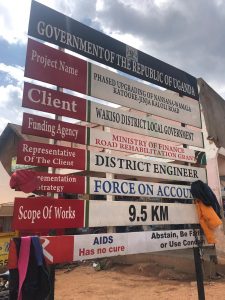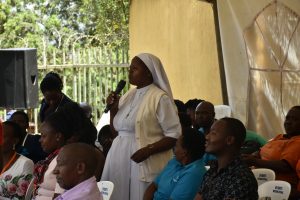Prior to CoST: Public infrastructure in context
While Uganda has passed laws to curb corruption in recent years, a failure to implement them remains a key problem within the country. According to a Transparency International survey from 2015, 69% of citizens in Uganda feel that the government does not do enough to fight corruption and 35% of respondents were afraid of the consequences of reporting corrupt practices. Transparency International’s Corruption Perception Index also shows perceptions of corruption to have steadily worsened since 2010: Uganda was ranked 142nd out of 180 countries in 2020.
In the infrastructure sector specifically, procurement audits carried out in 2014 by the Public Procurement and Disposal of Public Assets Authority (PPDA) found that contracts had been corruptly awarded to pre-determined bidders. One hundred and four cases of corruption were investigated in 2014/2015 and 45 companies were suspended from procurement and disposal procedures because of corrupt and fraudulent practices.
CoST Uganda: How it all began
The CoST membership application was made by the Uganda National Roads Authority (UNRA) in  2013, focussing on a desire to enhance transparency and accountability in the infrastructure sector by adopting CoST’s core features. UNRA made a commitment to engage stakeholders, oversight bodies and procurement entities with the CoST approach through monitoring, disclosure and knowledge sharing.
2013, focussing on a desire to enhance transparency and accountability in the infrastructure sector by adopting CoST’s core features. UNRA made a commitment to engage stakeholders, oversight bodies and procurement entities with the CoST approach through monitoring, disclosure and knowledge sharing.
Since joining CoST in 2014, Uganda has continually worked to embrace the initiative, showing a strong commitment to its core features of disclosure, assurance, social accountability and multi-stakeholder working. CoST Uganda released its first scoping study in 2017 which was declared to be a ‘’recipe for change’’ by the Minister of Works and Transport, Monica Azuba Ntege.
The study captured a baseline measure of transparency in public infrastructure in Uganda and demonstrated how CoST can be used and adapted to add value to its delivery. It revealed that Uganda has an ‘enabling environment’ for the implementation of CoST, but that there is still work to be done. Issues such as data capacity, a lack of judicial appeal mechanisms, the attitude of public officials, limited civic engagement, and poor information storage systems provide a challenge to implementing reform.
The study recommended that the government adopt a legal mandate for data disclosure in accordance with the CoST IDS It also recommended increasing access to information for citizens, building the capacity of citizens to use the information and forging links with other open data initiatives to increase CoST’s impact.
The four features of CoST
The core features of CoST: disclosure, assurance, multi-stakeholder working and social accountability, provide a global standard for CoST implementation in enhancing infrastructure transparency and accountability.
Disclosure in Uganda
The disclosure process ensures that data about the purpose, scope, costs and execution of infrastructure projects is open and accessible to the public, and that it is disclosed in a timely manner.
After the 2017 Scoping Study revealed low levels of disclosure in procuring entities, the CoST Uganda multi-stakeholder group (MSG) embarked on disclosure training sessions with the eight agencies concerned. These training sessions led to a marked increase in disclosure: for instance, the Ministry for Education’s disclosure rate increased from 33% in 2017 to 83% in 2018.
After a concerted effort from CoST Uganda and its host, the Africa Freedom of Information Centre, the Public Procurement and Disposal of Public Assets Authority (PPDA) has redesigned the Government Procurement Portal (GPP). It now incorporates 24 data points of the CoST Infrastructure Data Standard (CoST IDS), and is working towards disclosing the full 40 data points as required by the standard. CoST Uganda’s long-term goal is to develop an infrastructure section on the GPP which will enable the public to access information on all projects disclosed using the CoST IDS. CoST Uganda is also working with PPDA to incorporate the Open Contracting for Infrastructure Data Standard (OC4IDS) into the GPP.
Assurance
We promote accountability through the CoST assurance process – an independent review of the disclosed data by assurance teams based within CoST national programmes.
CoST Uganda has produced four assurance reports: the first in 2017, the second in 2018, the third in 2020 and the fourth in 2021.
The first assurance report highlighted issues such as delays in procurement, limited project supervision, a lack of assurance, limited citizen involvement. Levels of disclosure were also found to be insufficient: on average disclosure was just 50% of the information required by the CoST Infrastructure Data Standard.
The fourth assurance report showed a positive trend in disclosure practices since 2017. Overall disclosure levels (62%) increased by 20% from CoST Uganda’s Third Assurance Report in 2020, with increases in both proactive (55%) and reactive (70%) disclosure across the selected projects. This trend can be attributed to a growing understanding of the value of open and accessible data amongst procuring entities, as a result of long-term engagement and awareness raising by CoST Uganda. In addition, the PPDA has partnered with CoST Uganda to build capacity and provide training on practical elements of disclosure such as uploading information to the GPP. This has led to an increase in disclosure on the GPP specifically, with 344 projects disclosed between April-July 2021 compared to 195 between January-March 2021.
Multi-stakeholder working
CoST brings together stakeholder groups with different perspectives and backgrounds from across government, private sector and civil society. Through each national programme’s Multi-Stakeholder Group, these entities can guide the delivery of CoST and pursue infrastructure transparency and accountability within a neutral forum.
The Multi-Stakeholder Group (MSG) comprises 11 members with three members from civil society, five from government and three from the private sector. The CoST champion is the Ministry of Works and Transport, and the Chairperson is Hon. Nathan Byanyima of Uganda Bus Operators Association.
Speaking about the impact of CoST, Hon. Nathan Byanyima said: “(the assurance process) aims to identify good practice and areas of concern, and to engage stakeholders. But in the longer term, it aims to ensure infrastructure projects are better planned and better delivered.”
Promoting business integrity
Working as part of the UK Government’s Business Integrity Initiative (BII), CoST Uganda’s programme Promoting fair business practices in Uganda led to key reforms with the potential for lasting impact on competition, contract price and quality in public procurement. These include an increase in private sector understanding of – and participation in – the infrastructure procurement process which has increased competition, with the number of bids per tender for infrastructure projects increasing from 1.6 in 2019 to 12.5 in 2020.
Social accountability
The social accountability feature of CoST ensures that information on public infrastructure projects are in the public domain. CoST works with stakeholders such as the media and civil society to promote the findings of the assurance process and ensure decision makers are held to account.
One of the main ways CoST Uganda has engaged with citizens has been by holding ‘barazas’. Barazas  are a Ugandan tradition in which different stakeholders come together for constructive dialogue as a way to hold decision-makers to account. These have been instrumental in improving relations between local community and government and have improved infrastructure project delivery as a result. CoST’s first baraza was held in Wakiso District in 2017 where the findings of the first assurance report were discussed, and over 2020 CoST Uganda held five community forums directly targeting citizens on infrastructure projects subject to assurance.
are a Ugandan tradition in which different stakeholders come together for constructive dialogue as a way to hold decision-makers to account. These have been instrumental in improving relations between local community and government and have improved infrastructure project delivery as a result. CoST’s first baraza was held in Wakiso District in 2017 where the findings of the first assurance report were discussed, and over 2020 CoST Uganda held five community forums directly targeting citizens on infrastructure projects subject to assurance.
Speaking about the impact of barazas, Wakiso District Engineer, Samuel Mwesigwa said: “The CoST barazas have been a turning point. They opened our minds to the relevance of involving citizens in infrastructure project delivery, from planning right through to completion and post-completion phases.”
CoST Uganda also conducts training for journalists, the private sector and civil society. Throughout 2020, CoST Uganda brought together journalists from 45 media outlets to build understanding and interest in the more technical aspects of the infrastructure sector, as part of Promoting Fair Business Practices in Uganda. As a result, the ‘media team’ has grown to 57 committed journalists who published over 50 articles relating to Uganda’s infrastructure sector over 2020.
Get in touch
CoST Uganda Country Manager
Olive Kabatwairwe
o.kabatwairwe@infrastructuretransparency.org